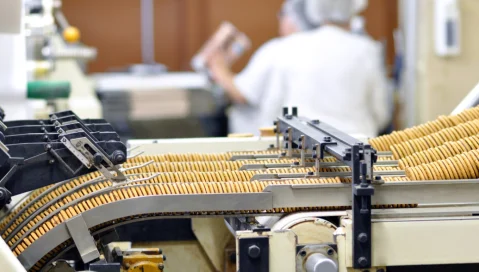Introduction
In today's busy globe, the demand for practical as well as ready-to-eat foodstuff is on the increase. This has resulted in an increased reliance on contract food manufacturing, where companies outsource the manufacturing of their food products to specific suppliers. Nonetheless, one facet that is frequently neglected in the agreement manufacturing process is efficient food storage space and also circulation. In this short article, we will certainly check out the value of efficient food storage and circulation in contract production and also its influence on the overall high quality as well as success of food products.
The Function of Contract Food Manufacturing in Australia
Australia has a flourishing food market, with a large range of neighborhood and also international brand names satisfying the diverse preferences and also preferences of customers. Contract food manufacturing plays a crucial role in this sector by supplying companies with the needed resources, competence, as well as framework to successfully generate their food products. From small startups to huge companies, numerous organizations rely on contract suppliers to bring their culinary productions to life.

Contract Food Manufacturing in Brisbane: A Hub for Innovation
Brisbane, the funding city of Queensland, is recognized for its vivid food scene and also ingenious cooking offerings. It comes as not a surprise that contract food manufacturing has actually grown in this area. With state-of-the-art facilities as well as a competent workforce, agreement food suppliers in Brisbane are well-equipped to handle the manufacturing requirements of various companies. Whether it's creating new dishes or scaling up manufacturing, these producers play a crucial function in bringing delicious food products to customers' plates.

Ensuring Top quality: The Trick to Successful Contract Food Manufacturing
When it pertains to contract food manufacturing, making sure item top quality is vital. Makers need to adhere to rigorous standards and also regulations established by authorities such as the Australian Food Requirement Code and also Good Manufacturing Practices (GMP). From component sourcing to manufacturing processes, every action must be diligently planned and also performed to keep the finest requirements. This not just ensures customer contentment yet also helps develop depend on as well as credibility for both the agreement supplier and also the brand name they are producing for.
The Obstacles of Food Storage in Agreement Manufacturing
Efficient food storage space is a critical aspect of agreement manufacturing. The correct storage of basic materials, components, and ended up items is food contract manufacturer necessary to keep their high quality as well as freshness. Nonetheless, this can be tough, particularly when dealing with subject to spoiling items or large quantities of inventory. Elements such as temperature control, product packaging honesty, and also inventory administration play an important function in making sure that food products continue to be risk-free for consumption throughout the supply chain.
Overcoming Storage space Obstacles: Technology and also Technology at Play
In current years, advancements in technology have changed the method food is saved and distributed in agreement production. From cutting edge refrigeration systems to advanced supply management software program, manufacturers now have accessibility to devices that can improve their operations and also guarantee ideal storage conditions. These technological developments not just improve food safety yet additionally enhance efficiency as well as minimize waste, eventually profiting both the maker and completion consumer.
The Relevance of Efficient Food Distribution
Efficient food distribution is another important part of successful agreement manufacturing. Once the food products are manufactured and kept properly, they require to reach their designated destinations promptly. Prompt distribution ensures that the products remain fresh as well as fulfill customer assumptions. Additionally, efficient circulation additionally lessens costs related to transportation and also logistics while optimizing total productivity.
From Ranch to Fork: The Journey of Food Products
The journey of food from farm to fork includes multiple stages, each needing cautious preparation as well as execution. Allow's take a better look at each step associated with this procedure:
Sourcing Raw Materials: Agreement food manufacturers function very closely with suppliers to source high-quality raw materials for their items. This includes everything from fresh produce to spices, condiments, as well as packaging materials.
Food Production: Once the raw products are sourced, the contract supplier adheres to a set dish and also production process to develop the desired foodstuff. This includes various methods such as cooking, cooking, mixing, as well as packaging.
Quality Control: Throughout the production procedure, quality assurance measures are implemented to make certain that the ended up item fulfills all safety and security and also high quality criteria. This consists of regular assessments, screening, as well as adherence to regulative requirements.
Food Packaging: After the product is manufactured, it is carefully packaged to preserve its quality and integrity throughout transportation and storage space. Contract producers often give customized packaging solutions customized to satisfy the certain requirements of their clients.

Storage as well as Distribution: As soon as packaged, the foodstuff are saved in suitable conditions to preserve their high quality. From temperature-controlled storehouses to effective logistics networks, contract producers make certain that the items are dispersed effectively as well as reach their locations on time.
FAQs
What is agreement food manufacturing? Contract food manufacturing refers to outsourcing the manufacturing of food to specific makers. This enables organizations to focus on other aspects such as advertising and marketing and also circulation while ensuring top quality products for their customers.
Why do firms choose contract food manufacturing in Australia? Firms select contract food manufacturing in Australia for different reasons, including cost-effectiveness, access to specialized proficiency, conformity with regulative requirements, and scalability of production.
What are the advantages of contract food manufacturing? The advantages of contract food manufacturing include decreased capital expense, access to sophisticated technologies as well as tools, increased manufacturing efficiency, faster time-to-market, and flexibility in meeting transforming market demands.
What is the role of food product packaging in agreement manufacturing? Food product packaging plays an essential function in agreement production as it makes certain item safety and expands service life. It also works as an advertising and marketing device by providing info regarding the item and also enhancing its aesthetic appeal.
How essential is food safety in contract manufacturing? Food safety is of utmost value in contract production. Abiding by strict food safety and security requirements makes sure that the products are risk-free for consumption and assists build customer trust.
How does efficient food storage space and distribution effect the success of contract manufacturing? Efficient food storage as well as distribution play a considerable function in the success of contract manufacturing. They guarantee that foodstuff continue to be fresh, reach customers in a timely manner, and preserve their quality throughout the supply chain.
Conclusion
Efficient food storage and also distribution are important elements of effective agreement manufacturing. From making sure product top quality to lessening wastage and meeting client assumptions, every element of the supply chain plays a substantial duty in supplying risk-free as well as premium foodstuff to customers. By leveraging technological advancements, sticking to regulative requirements, and focusing on client contentment, agreement makers can enhance their competition on the market while contributing to the general development of the Australian food industry.